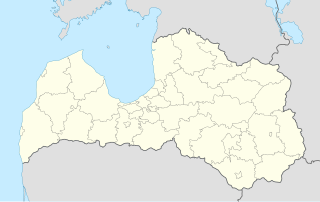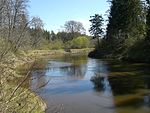World Heritage in Latvia
World Heritage Sites in Latvia (S = Struve Arch ) |
The world heritage in Latvia (as of 2016) includes two UNESCO world heritage sites , both of which are world cultural heritage sites. Latvia ratified the World Heritage Convention in 1995, and the first World Heritage site was added to the World Heritage List in 1997. The last World Heritage Site in Latvia to date was registered in 2005.
World heritage sites
The following table lists the UNESCO World Heritage Sites in Latvia in chronological order according to the year of their inclusion on the World Heritage List (K - cultural heritage, N - natural heritage, K / N - mixed, (R) - on the Red List of World Heritage in Danger ).
![]() Map with all coordinates of World Heritage Sites: OSM
Map with all coordinates of World Heritage Sites: OSM
| image | designation | year | Type | Ref. | description |
|---|---|---|---|---|---|
|
Riga, Old Town and New Town ( location ) |
1997 | K | 852 | The old town of Riga has retained its fortress character despite the demolition of the fortifications. The New Town of Riga, on the other hand, was built in the second half of the 19th century and is one of the most remarkable art nouveau ensembles in the world. | |
| Struve arch | 2005 | K | 1187 | Includes 34 specially marked geodetic measuring points along the Struve Arch in Estonia, Finland, Latvia, Lithuania, Moldova, Norway, Russia, Sweden, Ukraine and Belarus, which were used to precisely determine the figure of the earth in Northern and Eastern Europe.
In Latvia, the world heritage site includes:
|
Tentative list
The sites that are intended for nomination for inclusion in the World Heritage List are entered in the tentative list .
Current World Heritage candidates
Currently (2020) three sites are entered in the tentative list of Latvia, the last entry was made in 2020. The following table lists the sites in chronological order according to the year of their inclusion in the tentative list.
![]() Map with all coordinates of current World Heritage candidates: OSM
Map with all coordinates of current World Heritage candidates: OSM
| image | designation | year | Type | Ref. | description |
|---|---|---|---|---|---|
| Meander of the Upper Daugava | 2011 | K / N | 5610 | For the Latvians, the Daugava is a national symbol and is sung about as "Mother Daugia" (Lat .: Daugaviņa māmuliņa) and the "River of Fate". | |
| Grobiņa Archaeological Complex | 2017 | K | 6258 | Between the 7th and 9th centuries there was a large settlement of Scandinavian origin in Grobiņa . < | |
|
Kuldīga (Goldingen) ( location ) |
2020 | K | 6449 | At the rapids of the Venta there are settlements of hunters and fishermen from the 2nd millennium BC. Proven. Further downstream on a hill there was a fortification of the Kuren (Alt-Kuldinga) since the early Middle Ages . Has been on the tentative list as a culture / nature site since 2011. |
Former World Heritage candidates
These sites were previously on the tentative list, but were withdrawn or rejected by UNESCO. Sites that are included in other entries on the tentative list or that are part of world heritage sites are not taken into account here.
![]() Map with all coordinates of former World Heritage candidates: OSM
Map with all coordinates of former World Heritage candidates: OSM
| image | designation | year | Type | Ref. | description |
|---|---|---|---|---|---|
| Military cemeteries and monuments of freedom in Riga | 1991-1991 | K | Still applied for by the USSR, but rejected by Unesco in 1991. | ||
|
Košrags, village of the Livs ( location ) |
1996-2011 | K | 396 | Košrags is a village in the church today Kolka , originally by the almost extinct people of Liven was settled. | |
| The Daugavpils Citadel | 2005-2011 | K | 393 | ||
| Natural and cultural heritage of the city of Jūrmala | 2005-2011 | K / N | 395 | ||
| Abava Valley | 2005-2011 | N | 997 |
Web links
- Latvia on the UNESCO World Heritage Center website.
Individual evidence
- ↑ Latvia. In: whc.unesco.org. UNESCO World Heritage Center, accessed June 26, 2017 .
- ^ Tentative list of Latvia. In: whc.unesco.org. UNESCO World Heritage Center, accessed June 26, 2017 .
- ^ Former Tentative Sites Latvia. In: World Heritage Site. Retrieved June 26, 2017 (English).











